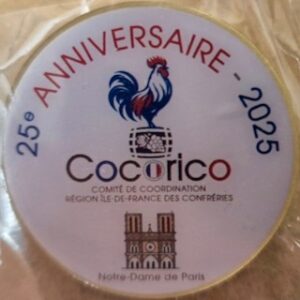The Autumn Chapter of the Conseil des Echansons de France was the occasion to recall the 30th anniversary of the publication of the “French Paradox”, with the participation of two eminent scientists who contribute to research on the positive impacts of wine on health when consumed in moderation: Dr. Dominique LANZMANN and Dr. Jean-Pierre RIFFLER.

being intronised by the Echansons de France in Musée du Vin
website of the Conseil des Echansons de France
Dr. Dominique LANZMANN, who has worked for many years with Pr. Serge RENAUD and continues his research, was inducted on this occasion. She communicated us the following text:
“ Ten years ago, a great scientist who revolutionized the world’s conceptions of nutrition, both by showing the importance of essential fatty acids and the role of polyphenols, in particular on thrombosis and the risk of myocardial infarction: Professor Serge Renaud, who would have been 95 today.

His story is intimately linked to his discoveries. Born into a poor wine-growing family in southwestern France in 1927, he left for Quebec after the war to pay for his studies by working successively as a lumberjack and train switchman. His first scientific observation was the frequency of myocardial infarctions in thirty-year-old Quebecers, something unthinkable in southwest France. He understood that he was not dealing with a genetic factor but with an environmental one, since the Quebecers shared the same genes as French. He then observed the differences in lifestyle between the Quebecers and the French of the southwest. First of all, he could not imagine a meal without wine, whereas in Quebec, there was no wine or fruit. He understood that food had to be the major factor. He wanted to study nutrition and was directed towards veterinary studies which he brilliantly passed at Sainte-Hyacinthe in Montreal, as major of his class. Then he became the principal assistant of Hans Sélyé, the inventor of stress, who would have liked to keep him but Serge Renaud wanted to unravel the mystery of the influence of nutrition on myocardial infarction. He worked at the Montreal Institute of cardiology, in anatomopathology and made his second decisive observation while dissecting hearts: the arteries of young hockey players were healthy! But clogged with thrombosis. Decades ahead of his time, he understood that thrombosis was the determining factor in myocardial infarction. For 40 years, he analyzed the effects of nutrition on thrombosis, on the cell, on the animal and finally in humans.
The key player in thrombosis is the blood platelet, which is responsible for sealing any breach in the bloodstream to stop bleeding. To study its activity, it must be done immediately, because as soon as blood is drawn, it acts in the blood tube. You can’t take the sample to the capital and study it the following week. Serge Renaud wanted to study the effects of diet on the activity of blood platelets in different rural populations. So he built himself a laboratory caravan and went with his laboratory technicians to different parts of Europe, and studied the activity of platelets in relation to diet, changing the diet. He identified the main factors in platelet aggregation: long saturated fatty acids, omega 6, age, feminine hormones. Conversely, the factors that decrease platelet activity are: calcium, omega 3, polyphenols and alcohol. He then set up the
He then set up the famous Lyon study on secondary prevention of myocardial infarction and was able to reduce recurrences of infarction by 76% in the intervention group receiving a diet that prevented thrombosis, inspired by the traditional Cretan diet.
In 1991, he was interviewed by Morley Safer for Sixty Minutes on CBS News, about the protection of the French against myocardial infarction despite having higher risk factors than Americans (cholesterol, smoking, blood pressure, consumption of saturated fats). In fact, the cardiovascular mortality of the French in 1991 was 3.5 times lower than that of the Americans. He proposed that moderate and regular consumption of wine with meal should be a determining factor in the cardiovascular health of the French. This led to an explosion of French wine exports to America in the 1990s.
See here a video broadcasted on CBS in 1991
30 years later, this “French Paradox” is proving to be very robust, as the French still have highest classical risk factors, but the lowest cardiovascular mortality in the world, passing the Japanese, being at the same time, the world’s leading wine drinkers. Professor Serge Renaud, a renaissance man, was always decades ahead of his contemporaries.”
This Autumn Chapter was preceded by a conference given by Dr. Jean-Pierre RIFFLER, Grand Connétable of the Conseil des Echansons de France, author of a book entitled “The Virtues of Wine”, which he presented.

In a clear language, he exposes the benefits of a moderate consumption of wine on health and the scientific works which support this assertion. As he says himself, the goal is not to encourage people to drink, but to reassure consumers about the benefits of moderate consumption. Let’s remember his credo: “Drink little, but drink better to live old! “
Let’s remember that the F.I.C.B. counts among its members the “RENAUD Society “, a brotherhood based in the United States which gathers doctors and other scientists, who are wine connoisseurs and who promote Pr. RENAUD’s work and support research on the theme ” wine and health “.






